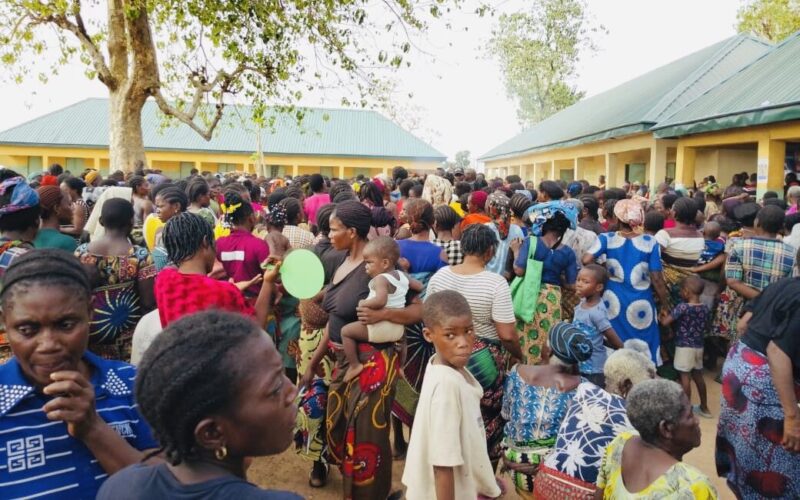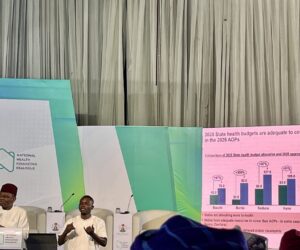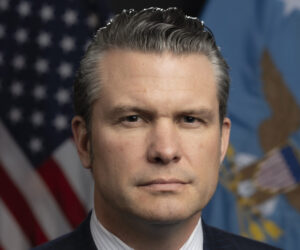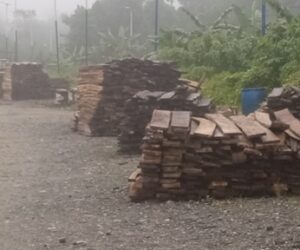Janet Terkimbir’s voice trembled as she recalled a harrowing night in May 2025, when labour pains tore through her body.
Eight months pregnant and living in the crowded Agagbe IDP camp, she crawled across the dusty floor of the mud-walled shelter, clutching her belly and gasping for breath.
Other women rushed to her side, trying to offer comfort, but there was little anyone could do. No hospital was within her reach, no doctor, no trained midwife.
Médecins Sans Frontières (MSF), a humanitarian organisation that once provided minimal assistance, had long since withdrawn.

Before dawn, Ms Terkimbir was soaked in sweat and weak from exhaustion. Her labour stretched into the morning, and the pain became unbearable. When the baby finally came, it wasn’t breathing.
Originally from Tse Adekule, a village in Gwer West Local Government of Benue State, Ms Terkimbir had fled her home after armed herders attacked, killing several residents and raping some women.
At Agagbe camp, which she now calls home, she has spent years living with the scars of that attack, but losing her baby in such a harrowing way reopened every wound.
“I suffered through the pregnancy with nothing. I thought at least the child would survive, but now the child is gone,” she said, her voice heavy with grief.
Her experience reflects the plight of hundreds of displaced women who face pregnancy and childbirth under harsh conditions in the IDP camps.
At Agagbe camp, Orhena Mzamber lost three babies in one night. She didn’t know she was carrying triplets because she never attended antenatal care. When her water broke, she was rushed to Naka General Hospital, but by the time doctors carried out an emergency operation, all three babies were dead.

“They said it was too late,” Mrs Mzamber recalled. “I didn’t even know I was pregnant with triplets.”
Now 32, Mrs Mzamber lives at the camp with her four surviving children. Her husband was killed when herders attacked her village, Tse Kpar, a community in Gwer West LGA, and she has been raising her family in grief and poverty ever since.
Insecurity and maternal health on a collision course
Nigeria is said to be the world’s most dangerous nation to give birth. According to the most recent UN estimates for the country, compiled from 2023 figures, one in every 100 women dies in labour or in the following days.
That puts Nigeria, Africa’s most populous nation, at the top of a league no country wants to head.
In 2023, Nigeria accounted for well over a quarter – 29 per cent – of all maternal deaths worldwide.
That is an estimated total of 75,000 women dying in childbirth in a year, which works out at one death every seven minutes.
Findings by our reporters show that for displaced women in Benue, these national statistics take on an even harsher reality. Interviews with women in Daudu and Agagbe IDP camps reveal stories of lost pregnancies, stillbirths, and declining health—all worsened by the absence of functional healthcare facilities.

Humanitarian organisations that once filled the gap have either scaled back or withdrawn due to insecurity and the reduction in international development assistance by Western countries, led by the US, leaving thousands of women to face childbirth with little more than hope.
For years, Benue has been one of the epicentres of brutal violence in north-central Nigeria, marked by systematic killings, mass displacement, and the destruction of entire communities.
The victims are largely agrarian communities, whose livelihoods have been shattered by incessant attacks primarily from armed herder militia groups.
What began as resource-based disputes over land and water access has transformed into large-scale criminal violence, underpinned by climate pressures, rapid population growth, ethnic-religious tensions, and, more importantly, state failure.
According to the International Organisation for Migration (IOM), more than 500,000 people have been internally displaced in Benue. Women and children, especially pregnant and nursing mothers, are the most vulnerable.
The Benue State Emergency Management Agency reported that as of June, 4,685 people were registered in IDP camps across the state, including nearly 3,000 women, with at least 122 pregnant.
The figure could be higher now due to the recent attack in Yelwata, which displaced an additional 18,000 people.
Displacement crisis
The dire conditions within the camps compound the impact of this growing displacement crisis. Poor infrastructure and limited access to basic health services, especially reproductive healthcare, remain persistent challenges.
Women are left without adequate care to prevent or manage complications during pregnancy and childbirth—leaving them at a significantly higher risk of maternal morbidity and mortality.
A study by the United Nations Children’s Fund (UNICEF) in Borno IDP camps found that women risk losing their newborns during night deliveries, when medical support is absent. The report stressed that safe childbirth requires not only medical care but also a sense of peace and stability, conditions that displaced pregnant women rarely experience in conflict zones.
Nigeria’s struggle with maternal health is not new. In 2001, the country joined other UN member states in adopting the Millennium Development Goals (MDGs), which included reducing maternal deaths by three-quarters by 2015. That ambition later shifted into the Sustainable Development Goals (SDGs), which aim to bring the global maternal mortality ratio to fewer than 70 per 100,000 live births by 2030. Yet, Nigeria remains one of the most dangerous places in the world to give birth.
The 2023–24 Nigeria Demographic and Health Survey (NDHS) shows that the under-five mortality rate stands at 110 deaths per 1,000 live births, meaning one in every nine Nigerian children dies before their fifth birthday.
Infant mortality is 63 per 1,000 live births, and neonatal mortality, deaths within the first 28 days, stands at 41 per 1,000.
In Benue State, under-five mortality is 53 per 1,000 live births, while neonatal mortality is 19 per 1,000.
These figures remain far from the SDG targets of reducing neonatal deaths to 12 per 1,000 and under-five mortality to 25 per 1,000 live births. Maternal mortality is still unacceptably high, with Nigeria recording 512 deaths per 100,000 live births—more than seven times the global goal.
Stories of losses

Janet Aondaveer was at the burial ground with her husband when horror struck again.
They had gathered in Gudu, Guma LGA, to bury relatives killed by armed herders when gunshots rang out.
Terrified, Mrs Aondaveer fled with her husband, carrying little more than fear and the child growing in her womb.
Now 28, she has four children, two of whom were born in Daudu IDP camp, where she currently lives.

Her first camp-born baby arrived safely in a general hospital, but three months later, malaria claimed the child’s life. With no steady access to medicine or healthcare, Mrs Aondaveer could only watch as her baby faded.
“I felt helpless,” she said. “Maybe if we were still at home, if I had food and support, my baby wouldn’t have died.”
The loss haunts her. She often wonders how different life might have been if she had her own house, proper meals, and quick access to medical help. In the camp, survival is a daily fight.
When she became pregnant again, Mrs Aondaveer nearly lost her own life. Sharp pains late in the pregnancy led to an emergency delivery.
Although the baby came out alive, she bled so heavily that it took urgent intervention to save her.
“Maybe I wouldn’t be here now if they hadn’t rushed me,” she recalled. That delivery was supported by Médecins Sans Frontières (MSF). But after the group pulled out of the camp, no organisation filled the gap. Her husband has carried the burden ever since.
For Margaret Timothy, another resident of Daudu IDP camp, the deepest wound came with the death of her newborn.

Originally from Nasarawa State, the 30-year-old mother of five has lived in the camp for seven years. She gave birth to two children there, the first without complication. But the second delivery was different.
As labour dragged on, the pain grew unbearable. Neighbours rushed her to the hospital, where doctors performed surgery. By the time it was over, the baby was gone.
“I was operated on, but the child was already dead,” she said softly. “Since that day, I’ve not been the same.”
Margaret tries to stay strong for her surviving children, but the grief lingers. “Sometimes, when I see other women holding their babies, I remember mine and it breaks me,” she said. “I forget myself sometimes while walking. My mind drifts.”
According to the International Journal of Gynaecology & Obstetrics, Nigeria ranks third globally for preterm births, recording about 774,100 cases annually. The journal notes that preterm deliveries are far more common among women who do not attend antenatal care (ANC), a gap that contributes significantly to neonatal deaths in the country.
The World Health Organisation (WHO) recommends at least eight ANC visits during pregnancy to improve outcomes for both mother and child. Yet, a 2024 study by the National Library of Medicine revealed that only 20.3 per cent of Nigerian women meet this standard.
For displaced women like Mrs Mzamber, who carry their pregnancies under harsh conditions in overcrowded camps, even a single ANC visit can feel out of reach.
Without money for transport or access to functioning health centres, proper maternal care remains a distant dream—and the risks of losing their babies remain heartbreakingly high.
Maternal Health at Breaking Point in Benue IDP Camps
In camps like Agagbe, childbirth often happens under shocking conditions, sometimes in toilets or beneath crude shelters.
With no skilled medical staff available, traditional birth attendants now oversee hundreds of deliveries each month. In one month alone, more than 200 births were recorded in Agagbe, a staggering number given the lack of basic facilities.
The federal and state governments have tried to plug some of these gaps by sending relief materials and limited medical support. But with new waves of displacement adding pressure, these interventions fall short.
Speaking with our reporters, the Information Officer of the Benue State Emergency Management Agency, Terma Ager, said the government has signed a Memorandum of Understanding (MoU) with several health centres near IDP camps to provide basic healthcare services for displaced women.
READ ALSO: Plateau inaugurates technical group to strengthen HIV prevention, maternal health
Mr Ager admitted, however, that the situation is worsening. “The increasing wave of violent attacks across the state has deepened the humanitarian crisis, putting additional pressure on the government,” he said.
He also acknowledged that the withdrawal of humanitarian groups such as Médecins Sans Frontières (MSF), due to funding shortages, has left significant gaps in healthcare provision.
He stressed that the state government alone cannot meet the growing needs of displaced populations and appealed for stronger support from the federal government and international partners to bridge the humanitarian gaps.
Experts Raise Alarm, Call for Urgent Intervention
Speaking with our reporters, a consultant obstetrician and gynaecologist, Qudus Lawal, raised concerns over the worsening reproductive health crisis in Benue’s IDP camps.
“It’s unfortunate that globally and locally in Nigeria, crises keep displacing people from their homes. And this, as you rightly mentioned, leads to reproductive and general health issues that limit the well-being of people,” Mr Lawal said.
He stressed that even in non-crisis settings, Nigeria’s healthcare system faces significant challenges, but displacement makes the situation far worse for women.
According to him, maternal mortality, lack of skilled birth attendants, and limited emergency services in overcrowded camps are driving preventable deaths.
“The alternative would be that those within camps go to surrounding communities to get services, but this is not always feasible,” he noted.
READ ALSO: UNICEF, partners to provide 3 million bottles of supplements to boost maternal health
“There are also higher risks of sexual assault, rape, and unwanted pregnancies in camps. Unsafe abortions are rampant, which can lead to death and other complications.”
Mr Lawal also highlighted increasing cases of sexually transmitted infections and the heavy mental toll of displacement.
“Health is not just the absence of disease,” he explained. “It has to do with mental, physical, and social well-being.
Mental well-being is also affected for those in IDP camps.”
On poor access to prenatal services, he warned that weak camp clinics are worsening childbirth outcomes. “It affects the childbirth process, increases the risk of mortality, and affects the subsequent care that children receive after delivery,” he said.
Mr Lawal recommended better planning in camps, stronger referral systems, and telemedicine to connect women with skilled health professionals. He also warned that reduced support from international partners such as MSF would worsen the crisis unless governments intervened.
“They [IDPs] have no place else to go,” he said. “The government should fast-track resettlement, revamp security to allow them to return home, and in the meantime, coordinate with NGOs and local partners to ensure quality health services are delivered.”
Grace Rimamnunra, a consultant public health physician at the Benue State University Teaching Hospital, raised grave concerns over unsafe delivery conditions that expose women and newborns to infections.
“Pregnant women are at risk of getting infected during delivery, and their babies too can get infected with neonatal sepsis,” she said, pointing to unsanitary environments, lack of sterile tools, and untrained birth attendants as major drivers of complications.
Ms Rimamnunra also warned of rising cases of vesicovaginal fistula (VVF) caused by prolonged, obstructed labour without skilled care or timely emergency interventions.
To address these issues, she emphasised the urgent need to strengthen the primary healthcare facilities surrounding IDP camps.
“The government can build up security to enable the IDPs to return to their villages,” she suggested. “NGOs can help supply commodities at the primary health care facilities around the camp to enable proper hospital care.
Health care workers can carry out free medical outreaches in the camps as their community service.”
This reporting was completed with the support of the Centre for Journalism Innovation and Development (CJID)









